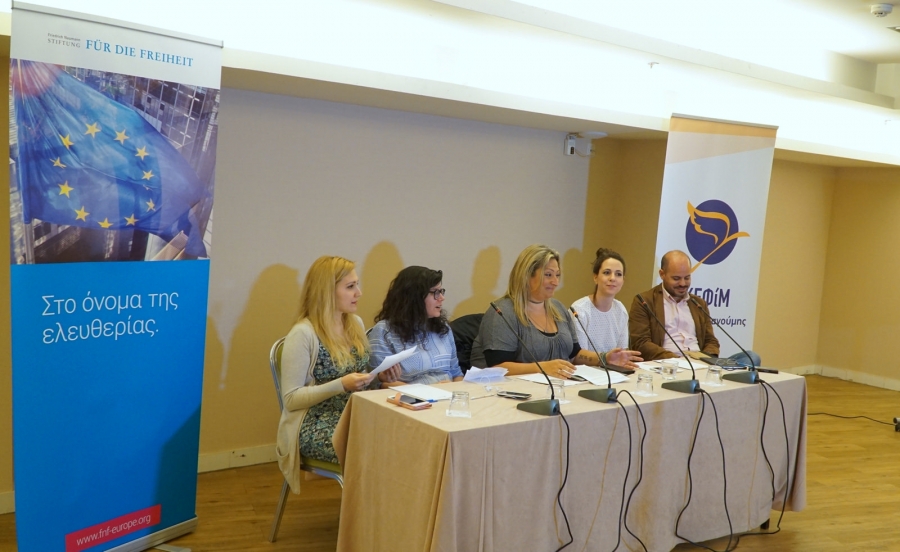
The Liberal Approach to Feminism

Abortion. Family violence. Sexist stereotypes. Supplementary maternity services. Gay families. Gender mainstreaming. Quotas. The History of the Women’s Movement. Conservatism. Legislation. Do all of the above fit into a single discussion?
The event organized by KEFIM on 2.5.2017 lasted more than 2.5 hours and touched all of the above issues, engaging audience and speakers.
The Liberal Approach to Feminism
Maria Tsakou, lawyer and co-ordinator of the event, noted that “All women have, at some point in our lives, rationalized our choices because of the deep rooted stereotypes within the nature of the woman. Classical liberalism does not accept any policy based on criteria such as gender, race, sexual preference or anything else, therefore feminism cannot be excluded from the liberal agenda.”
Yulie Foka-Kavalieraki, Ph.D. in Philosophy of Social Sciences – University of Athens, set the ideological framework in a simple and understandable way, to distinguish reality from the wishful thinking: “Regulatory proposals are about how things should be. Descriptive proposals are about reality. Often people confuse how they would wish for things to be in the society with how things truly are, and that applies to the position of women too.”
Speakers underlined the fundamental differences of feminism from feminism. Firstly, liberal feminism, like liberalism, is based primarily on the notion of negative freedom: that is, it focuses on how to lift the barriers for the individual – therefore the woman too – so as to find their way. For liberals, women – just like men – should be able to choose as freely as possible. The second difference is that liberal feminism remains suspicious of the state role, and therefore is more closely related to the first feminist movement of the 19th century. “Liberals are definitely feminists, but feminists are not necessarily liberals,” said Dr. Foka – Kavalieraki.
“We ensured legal equality, but we have not even reached a point where there is really access equality for women,” said lawyer Vivian Stergiou. “There is a complacency: since we wrote in the Constitution that all Greeks and Greek women are equal, we became silent. But there are so few women in politics, boards of directors or administration. You may say that Marie Curie won the Nobel Prize, but this does not mean that there are many women scientists. When you use the extraordinary to conclude about the general, you hide your conservatism.”
Katerina Papanikolaou, a Gestalt psychotherapist and political activist, explained the concept of gender mainstreaming: the gender perspective is a concept for gender equality policies that go beyond the legislative framework. “Gender mainstreaming involves the overall change of culture and how society supports the woman to claim her choices. A simple example is a company that prepares a bonus trip during the Christmas season and should think about whether this trip would be as attractive for men as it would women.”Mrs. Papanikolaou also referred to quotas, which is defined as a form of positive distinction, expressing her opposition.
“All positive measures of discrimination must be short-term, otherwise they lose their meaning – the same goes for quotas,” said Lefteris Papayannakis, deputy mayor of the City of Athens and “Free Thinking Zone Lean In” spokeswoman. He noted the risk of resting on the achievements of the women’s movement in the 1980s. “We have a long way to go yet,” he continued and later referred to how religions in western societies have gone beyond their role, often imposing social norms of inequality.
The event ended with a burst of questions from the audience, while the video is available in our YouTube channel.
Σχετικά άρθρα
 Επιστροφή στη λίστα
Επιστροφή στη λίστα


